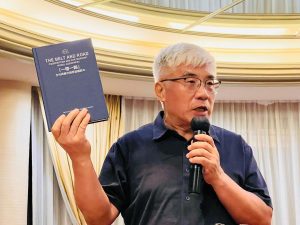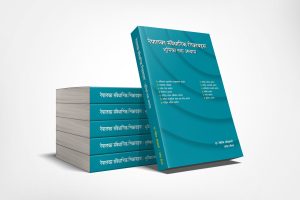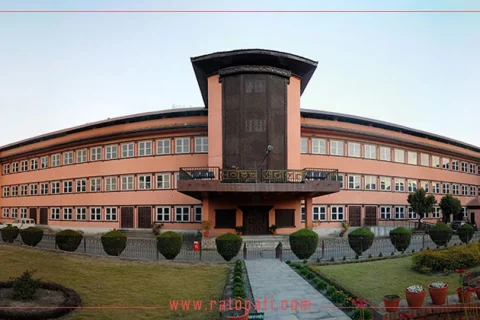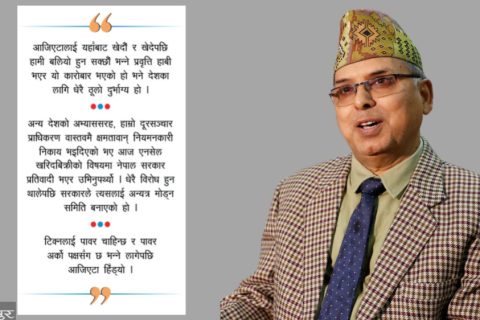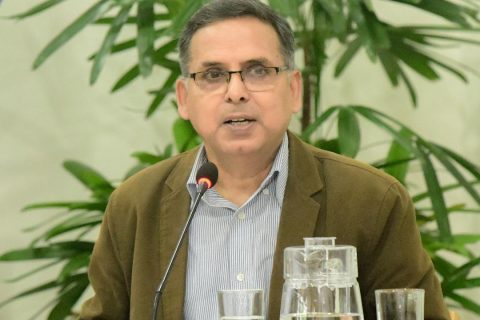(Dr Bipin Adhikari’s comments on Mr Alizedney paper presented in 2015 ALIN General Meeting and International Conference September 17, 2015, Seol, Korea)
Mr Alizedney M. Ditucalan paper on The Bangsamoro Basic Law: The Philippine Model of Legislative Peace Settlement and Its Constitutional Ramifications is a very well written piece of article on the struggle to reconcile the differences between the Moro people’s right to self determination in Mindanao and the Philippine state’s national interests.
As an outsider, it is often difficult to comment on issues that we have very little inside information on. However, this article must be commended on its intelligible structure and an eloquent description of events and underlying issues. This has helped paint quite the picture and made it relatively uncomplicated to understand the major issues.
As I understand, there is currently a proposed Bill called the Bangsamoro Basic Law (BBL) based on the longstanding agreements, notably the Comprehensive Agreement on Bangsamoro (CAB) and the Framework Agreement on Bangsamoro (FAB), between the Government of Philippines (GPH) and the Moro Islamic Liberation Front (MILF), which is under extensive discussions in both the chambers of the parliament. If adopted, the Basic Law will codify the aspirations of the past agreements and usher in changes that could have a lot of ramifications for both the state and the Bangsamoro autonomous region.
Moreover, some of the provisions contained in the past agreements, i.e. Comprehensive Agreement on Bangsamoro and Framework Agreement on Bangsamoro have been deemed incompatible with the 1987 Constitution. In light of this, the author seeks to find a middle ground between balancing the state’s interests vis-à-vis the constitution, on the one hand, and the Moro people’s aspirations on the other. In doing so, there are some constitutional issues that need to be resolved. At this point, I would like to enquire whether the Bangsamoro Question is an isolated event in Philippine polity or are there other political forces driven by different ethnic/religious groups simultaneously seeking similar rights to autonomy and self determination? This will bring in the challenge for the state to ensuring equality to all in its dealings.
The historical context on the Bangsamoro peace settlement provides an intriguing backdrop for a constitutional enthusiast like me to understand the nature of the conflict in Philippines. The perennial struggle between the state and the Moros, as the author has explained, is not just confined to armed struggle but extends to the power struggle between the major constitutional structures of the nation, i.e. Legislative, Executive and Judiciary. It is apparent reading from the historical context that the struggle has been a long one lasting decades. It is also undeniably apparent that efforts have been made in the past to initiate peace process between the opposing forces, namely the Tripoli Agreement of 1976, Final Peace Agreement 1996. However, such efforts have been thwarted by either the policy changes at the top vis-à-vis change in administration or through the judicial decisions against the agreements, namely the striking down of the MOA-AD as unconstitutional. In either of the cases, it seems both the parties were at a loss as the struggle for peace continued. At this point, it would be appropriate to highlight the national view on the state of proceedings between the GPH and the MILF. Are majority of the Pilipino people pro-BBL or are they against the enactment of BBL? This could be an intriguing political question in our present context.
In the current scenario, it has been opined that a resolution can at last be achieved to put an end, once and for all, to the constant struggle through the enactment of the Basic Law. However, despite the longing for peace from both sides, implementing the agreements as the author has eloquently pointed out is a tricky scenario. First of all, the enactment of Basic Law is a legislative prerogative and as such the Congress holds the final say or utmost discretion in the formalizing process without any express obligations to enact the requisite law. Secondly, the constitutionalism of the BBL needs to be thoroughly reviewed. As the author pointed out, judicial review is inevitable and if the BBL is to survive such scrutiny from the judiciary later on then active discussions on the constitutionality of the enshrined provisions of the BBL must be discussed at the earliest. In light of this, it begs the question, how prevalent is “judicial activism”1 in Philippines? Do the judges favor the enactment of BBL or have they remained neutral in the process?
In this context, the issue of form of governance in Bangsamoro is one of the contentious issues due to the perceived incompatibility of a presidential system at the national level and parliamentary system at the autonomous region. Citing examples from UK, France and the 1973 Constitution of Philippines, the author stresses that the concept of mixed system is in fact workable and therefore not unconstitutional. Similarly, the second major opposition to the constitutionality of the Comprehensive Agreement on Bangsamoro and Framework Agreement on Bangsamoro were the compatibility of the parliamentary form of governance with the Section 18 of Article X of the 1987 Constitution. In this context, the author opined that the constitution grants the Congress power to define the “basic structure of the government” as long as it contains a representative and elective departments, i.e. legislative and executive.
The third issue was whether or not Congress can abolish the present Autonomous Region in Muslim Mindanao and replace it with Bangsamoro Autonomous Region. In answering this, the Constitutional doctrine whereby a former legislature cannot bind a successive legislature has been used as a persuasive argument. The principle in Duarte v Dade, furthers this concept by highlighting that the court has the duty to strike down laws that attempt to limit the power of Congress to amend or repeal laws. These are the reservations of the GPH and the critics against the enactment of BBL. However, there aren’t any mentions of the reservations of the MILF or the Moros regarding the impending enactment of BBL. Are the Moros completely satisfied with the Comprehensive Agreement on Bangsamoro and Framework Agreement on Bangsamoro? Have all their demands been met? Are there any specific rights or guarantees that have been omitted from the agreements which the Moros would like to incorporate?
The concern that the Bangsamoro political entity is akin to sub-state that will cause dismemberment of the Philippine territory is a valid concern. This is something being actively discussed in Nepal currently in light of the current federalization process. However, the context of asymmetric relationship is a concept designed to allow more leeway to the autonomous regions to exercise more power and entertain less intervention from the national government. This will also provide assurances to the Moros that their special historical and cultural heritage, economic and social structures, and other relevant characteristics have been acknowledged by the state. In light of this, as the author has pointed out, the relationship must be clearly defined and the powers clearly delineated between the National Government and the Bangsamoro to avoid any future clashes between authorities. In this regard, I have a few queries:
- Is the distribution of money between the National Government and the Autonomous Region not a big debate in the Philippines? I understand that Philippines is a unitary state, however, the issue of distribution of money does not seem to be part of the debate. Is there a particular reason for that?
- What structures have been put in place to adjudicate the disputes arising between the autonomous region and other regions? Which laws would prevail? Having a separate legislative department means that the autonomous region will have the power to enact its own laws. Which laws would prevail in cases of dispute between a national legislation and Moros legislation?
Another major objection to the enactment of Basic Law is the incompatibility, with the 1987 Constitution, of the grant of specific powers such as concurrent powers and exclusive powers to the Bangsamoro. Critics have sought to argue that granting Bangsamoro with such powers means the abdication of the indivisible powers of the state. The author, in contrast, argues that this in fact is not the case. A redefining of decentralization would put the granting of such delegation of powers within the boundaries of the 1987 Constitution. This is the norm in modern day unitary states and according to the author, Government of Phillipines and the Moros would both benefit from such an arrangement. At this point, the argument could be further strengthened with comparative models of nations favoring the decentralization of powers from the centre to the regional levels. Also, the demographic of the Moros in contrast to the other ethnicities, religions or communities residing in the Philippines could be another pertinent point mentioning in the research paper.
Finally, the author touches upon the uncertainty regarding the final draft of the Basic Law. At present, there are three versions of the Bill, each containing slightly different provisions from one another. This could be problematic as drastic alterations to the agreement would not be acceptable to the Moros. The third Bill, proposed as Marcus’s substitute Bill, has already been deemed unacceptable by the MILF. The Bicameral Conference Committee of the Congress has been entrusted to reconcile the conflicting versions of the two Houses of Congress. This committee has the power to amend, substitute or re-create the Bill depending upon the circumstances. Thus, the onus is on the committee to finalize a Bill that is acceptable to all the parties, promotes justice, rule of law, establishes order and protects and promotes the rights of individuals in society.
In this scenario, it is pertinent to enquire the inclusiveness of the Pilipino Congress as regards to the Moros. How well are the Moros represented within the Pilipino congress? Do they hold a large minority capable of being taken seriously or a smaller minority which could be easily brushed aside? Furthermore, how well are the Moros represented within the Bicameral Conference Committee? Lastly, are there any provisions for affirmative action ensuring the appropriate representation of the Moros within the Pilipino Congress?
This paper helped me draw a lot of parallels with my own country where there are a lot of groups, much akin to the Moros, seeking similar autonomy within federal Nepal. The armed rebellion of the United Communist Party of Nepal (Maoist) ended with the signing of the Comprehensive Peace Agreement with the state in 2007. Following this, some of the Maoist cadres were also integrated in the state armed forces. The armed rebellion sought to end the Monarchical state structure of Nepal and create a Federal Democratic Republic devoid of alienation, discrimination of the marginalized communities.
In light of this, Nepal has endeavored to promulgate a new Constitution keeping in line with the Comprehensive Peace Agreement signed in 2007. In doing so, we have grappled with a lot of the similar issues currently being discussed in the Philippines regarding the Bangsamoro Question. In the same vein, the impending formation of federal states, based on ethnic diversities, in Nepal has generated fears of secessionist movements. Quite often rebels do not want to establish the rule of law, democratic principles and the concept of constitutionalism when they find they will be weakened by these formulations. The efforts to create an acceptable Constitution have been largely elusive due to the constant stalemate between the opposing political forces. In the same vein, is there a possibility in the Philippines that the political process would further elongate the enactment process? Also, in Nepal, the civil society has been largely proactive and been credited for initiating rights activism and human rights movement. In the same vein, has the civil society in Philippines played a major role in the shifting of attitude among people? Have they been important in bringing the Moros under the legal regime?
In essence, peace settlement is a give and take process and justice must prevail in the given context. Very often there are instances where the give and take cannot be compromised in the Constitution. This happens largely due to the excessive demands of the people seeking outlandish pleadings from the state which cannot possibly be guaranteed in the Constitution or Basic Law if that contravenes the Constitution. In this context, how rational are the demands of the Moros? How have they been viewed not just from the author’s perspective but also the national perspective? In conclusion, I would like to congratulate the author on the enlightening piece of work.



